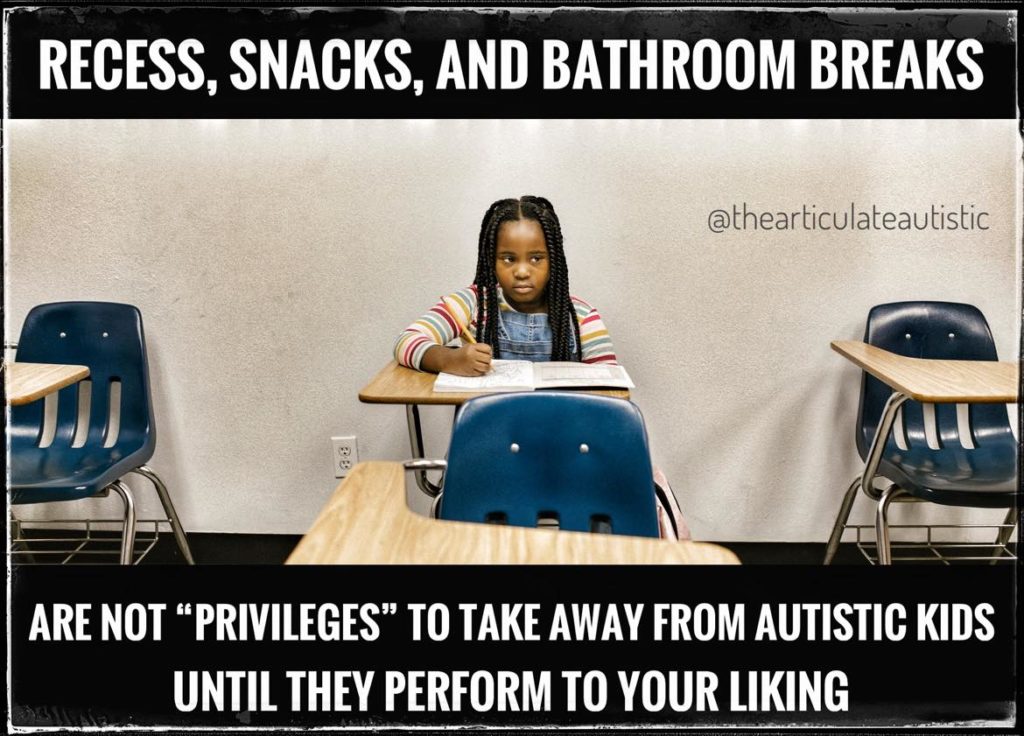Recess, Snacks, and Bathroom Breaks Are Not “Privileges” to Take Away From Autistic Kids Until They Perform to Your Liking

I’ve talked before on this blog about why ABA is torture for autistic people, but I’ve never really broken down exactly what ABA practices constitute torture, at least not on this minute level, but I feel it’s important.
ABA Traumatizes Autistic Teen – A Firsthand Account
The Wool Hat Story – ABA Torture of Autistic Child
Saying “ABA is torture” is just too broad. It gives too many people an opportunity to say, “Not the ABA that MY child is in!” because there are so many different ways to practice the same method.
However, I’ve been noticing autistic people and our supporters talking about just one of the factors that make it tortuous: Withholding basic human needs as a way of “motivating” (read: controlling) autistic children to “behave” (read: perform) in accordance with neurotypical standards.
This means, while your child is at school, they could be being denied recess and break times, food, and bathroom breaks, which are basic human rights and needs until they do whatever it is their teacher has asked of them.
This is torture. (Trigger Warning – I have included some real-life examples of this type of torture from a paraprofessional who wishes to remain anonymous.)
Recess/Breaks
Recess is not a privilege, it’s a need. Everybody, regardless of age, needs a break now and again from learning or working. None of us are automatons that can just work until we drop or until we get a task finished (although some of us autistics will do exactly that when we’re in hyper-focus, but nobody is forcing that on us).

Imagine if you were at the office, and your boss had just dumped a pile of work on your desk and said you couldn’t rest, eat, or use the bathroom until it was finished. That would be considered “hostile working conditions”, and it would be illegal, but it’s perfectly fine to do to children?? I don’t think so.
Rest and play are important and necessary for everyone, regardless of neurotype, and withholding this essential to sanity is cruel and wrong.
I’ve heard of cases where autistic children are left in the classroom with the teacher while their peers go out to play because they haven’t finished a certain task or aren’t doing exactly what they’re told.
First of all, being autistic in a neurotypical world is already traumatizing. The world is already too loud, too bright, too sticky, too scratchy, and too confusing for us as it is, so our stress levels are already high on a daily basis.
Compound this with teachers who have absolutely no understanding of how the autistic mind works and are refusing necessary rest and break times to a child who was already struggling before he walked into the classroom is doubly cruel because now he’s confused, unfocused, and exhausted, and his teachers still won’t let him take a break until he does whatever it is they’re telling him to do, even if he doesn’t understand how to do it, or he doesn’t have the emotional bandwidth at that moment.
Children who are stressed and confused are not “motivated” by this method to do whatever is being asked of them, they just want to escape, so they can recharge and try again later, but they are being denied that ability, and it’s making things 10 times worse.
Henry’s Story

“Henry* is a 10-year-old autistic child with extreme anxiety. His behavior plan explicitly states that after 10 minutes of work, Henry is allowed a 15-minute break. Even if he is unable to complete a full 10 minutes of work, he is still allowed to have his break, according to his behavior plan, because he tried. However, the teacher in charge decided to go against this plan by coming up with her own: If he perseverates on his anxiety and seeks reassurance instead of focusing on his work, he doesn’t get ANY breaks for the day.”
Anonymous Paraprofessional
Snacks/Lunch
This one really makes me livid. Food is a human right. Read that again: Food is a human right. It is not a “treat”, it is not a “motivator”, it is nutrition that the human body needs to survive and thrive.

Denying a child a snack or lunch because she hasn’t performed to some expected standard that makes no sense to her, or she’s had a meltdown, or she’s flatly refusing to do something isn’t education, it’s torture. I shouldn’t even have to explain that. I don’t care what a child does or doesn’t do or what neurotype they are, you do not use food as a reward or punishment, and you do not withhold it to get compliance because you don’t know how to communicate effectively with us.
Tony’s Story

Tony* is a 10-year-old autistic child with poor proprioception (like many of us). He accidentally knocked over a beaker in science class, and the teacher yelled at him and told him he had to come back on his lunch break to help her clean out all the other beakers, so he wasn’t able to eat lunch that day.
Anonymous Paraprofessional
Bathroom Breaks
I’m just seething over this one. Not only are they being denied to autistic children who won’t “comply”, bathroom breaks are kind of a personal trigger for me. As a kid (and even now as an adult), I had to pee all the time. There’s no physical reason for it, I’ve been tested for diabetes more times than I can count–I don’t have it, but I’ve always had to go to the bathroom far more frequently than my peers.
Even as an adult, I had an instance in the workplace where my boss literally listened outside the bathroom door to decide if I was actually peeing or “doing something else” in the bathroom. It was mortifying.
Educators have denied bathroom breaks to autistic and neurotypical children as a way of maintaining control over them and obtaining compliance from them. It’s sick. Granted, this seems to happen a lot more to autistic children, but it shouldn’t happen to anyone.
Again, bathroom breaks are a human need and right. Taking them away or delaying them not only causes physical and psychological pain, it also can cause the child to have an accident, which only further embarrasses them in front of their peers, who are likely already picking on them.
Furthermore, it can cause autistic children to ignore their natural urges to void, which can lead to bladder infections and fecal impaction.
Trevor’s Story

Trevor*, 14-year-old non-verbal (mostly) autistic child. He stimmed in class when he wasn’t supposed to (according to his behavior plan), and when he asked to go to the bathroom, his teacher said he couldn’t go because his stimming had ‘disrupted the class’.
Anonymous Paraprofessional
*Names have been changed.
Controlling and Manipulating Children into Compliance is Abuse
If your child’s teacher is taking away recess, breaks, food, and bathroom breaks for any reason, they are abusing your child. Period, end of sentence.
If you do it yourself, at home, you are abusing your child. Period, end of sentence.
You may not see it that way, and you may have been told by your ABA therapist that taking away these basic needs is something you need to do in order for your child to act more like a neurotypical person, but you’ve been brainwashed.
That kind of denial of basic human needs isn’t teaching, it’s torture.
If you do get any compliance out of your child/student because you’ve delayed or taken away rest, food, and bathroom breaks, you have not “won” or “achieved success”. You have only succeeded in permanently psychologically damaging your child/student by showing them that their needs don’t matter, that they must kill who they truly are inside in order to “act neurotypical”, and that other human beings are not to be trusted.
How to Better Understand Your Autistic Child
I’ve said this so many times, but it bears repeating as often as necessary: When a child is first diagnosed autistic, many medical professionals still don’t really know what that means. They’re reading from a script, rattling off a set list of traits, and frightening parents with worst-case scenarios and outdated statistics.
Out of this fear that’s been instilled in them, parents become desperate to do anything to help their child, and they can actually get suckered into torturing them “for their own good”. They may even go against their natural instincts as a parent because authority figures have told them that they must enroll their child in ABA, or he or she will never be able to function in life.
Society hierarchy is a difficult concept for us autistics. We cannot wrap our brains around how easily some neurotypical people can be brainwashed into dangerous groupthink.
I really don’t mean that offensively. I mean, neurotypical people can’t wrap their brains around a lot of what we do, but the tendency amongst neurotypicals to follow authority figures to the exclusion of instinct and common sense can be very, very dangerous for autistic people.
The tendency amongst neurotypicals to follow authority figures to the exclusion of instinct and common sense can be very, very dangerous for autistic people.
That’s why I believe it’s imperative that any teacher working with an autistic student and any parent (even a foster parent) of an autistic child must consume content made by autistic creators.
A lot of what neurotypical people end up doing to autistic people on a daily basis isn’t as extreme as these examples, but it can still cause emotional trauma. I call these things “Unintentional Gaslighting”, and you can read about it by downloading my FREE eBook, linked below.
Unintentional Gaslighting Causes Complex PTSD in Autistic People
Recommended Websites
https://neurodivergentrebel.com/
Recommended Books
Want downloadable, PDF-format copies of these blog posts to print and use with your loved ones or small class? Click here to become a Patreon supporter!





I barely realised this counted as abuse before. It’s so normalised in education, regardless of the child’s neurotype. I’m used to being punished this way – it never stopped being shocking, but I came to expect it – and I imagine for children in ABA where the targets set for you to “earn” meals/breaks are already repressive and unhealthy goals, it does an even higher level of emotional damage.
Indeed.
I especially hate the toilet break one. Thankfully I can’t say I’ve heard of or experienced others you’ve mentioned but in high school we were always told “oh but you should have gone at recess/lunch break etc” but I’d think and I’m sure others did “but I didn’t need the toilet then”
It was made as an assumption on the basis that students wanted to simply escape class. I have a friend who needed to get a pass to be able to go to the toilet during class which I now think is ludicrous. She had to have a pass to prove her medical condition that made her need to pee frequently.
I also think school was overwhelming because we were expected or felt pressured at a certain time in high school – (GCSEs in the UK) to come in to complete art work during our lunch hours. I am a slow eater and I wouldn’t necessarily be able to get focused on starting to complete some work. I mean for people that weren’t me it still would have been a lot because everyone had multiple subjects and many compulsory ones and other subjects it seemed would want people to come in and complete any extra coursework. How did anyone get a lunch break during those years I wonder?
I gotta wonder, what do they think this is teaching children? As an adult, I’ve never been in a situation where I’m just flat-out not allowed to seek a bathroom. It’s not preparing you for adulthood. In fact, it took me a few months of university to figure out that I could go to the bathroom during class if I wanted to.
And for disabled kids who might’ve only recently stopped using diapers, it’s even worse. Any parent of a toddler knows that a kid who’s recently stopped using diapers should never be expected to wait for a bathroom.
I agree completely. I wish this wasn’t such a common experience. It seems unthinkable!
When I was in elementary school 55 years ago, during bathroom breaks our teacher stationed herself at the water fountain and allowed each child a mere *two seconds* to take a drink!
In addition to autism, I have severe asthma and allergies (MCAS?), requiring me to take an antihistamine daily. The side-effects of antihistamines back then made me extremely thirsty (and drowsy — imagine a sleepy, thirsty autistic child struggling through school each day).
Yet the teacher, a pillar of our community, wouldn’t budge in the rigid application of her “two-second rule”. She even ignored a written note from my allergy specialist (“You can pay a doctor to write anything!”). Even the school principal personally tried to prevent my mother from handing me glasses of water through the school gate during recess breaks!!!
As the teacher stood at the water fountain counting out the Two Seconds, she also noticed my discolored teeth. “Don’t you ever brush your teeth?” she mocked. I tried to explain that the discoloration was due to the antibiotic Tetracycline that I had to constantly take just to bolster my weak immune system enough to attend school. But she cut me off with a dismissive wave of her hand and a loud “AARRGGHH !!!”
I’m sorry that happened to you, Dave. Thank you for sharing your story.
I remember one time in elementary school, someone carved a profane word on the door of the boys’ bathroom. The result? I and the rest of the boys were kept inside for recess so the teachers could question us.
And in high school, my ESL teacher had a rule in which if one or a few kids didn’t turn in an assignment, the ENTIRE CLASS didn’t get free time. I talked to the teacher about this, but she didn’t budge.